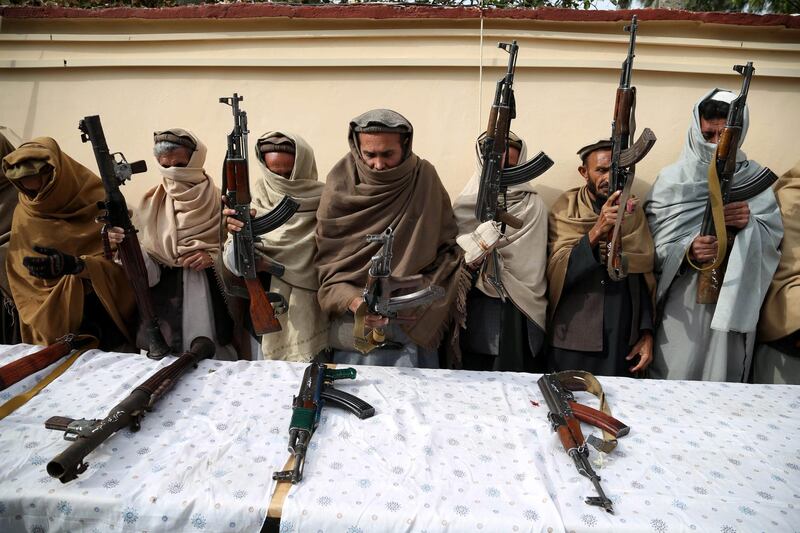Afghanistan has achieved the unwelcome distinction of becoming America’s longest war. For the sobering fact is that US forces have now been fighting in the benighted country for longer than the First World War, Second World War and the Korean War combined.
So it is entirely understandable that, following recent reports that there has been a breakthrough in negotiations taking place between the US and the Taliban, hopes have been raised in Washington and elsewhere that American involvement in the conflict is finally drawing to an end.
That is certainly the outcome that US President Donald Trump would like to see after he indicated at the end of last year that he was considering withdrawing half of America's 14,000 troops in the country, a move that – alongside the highly contentious Syria withdrawal – is thought to have prompted the resignation of Jim Mattis, the respected US defence secretary.
From the moment he entered the White House, Mr Trump has made it clear he has no appetite to prosecute long and costly overseas military adventures. When faced with a specific threat, such as that posed by ISIS in Iraq and Syria, the president is prepared to deploy the full weight of American military might. But as soon as that threat has receded, his central priority is to withdraw forces, thereby saving the US further unnecessary costs in terms of blood and treasure.
It is a paradigm the White House has applied to the Syrian conflict, where Washington has unilaterally ordered the withdrawal of its remaining 2,000 troops, to the great dismay of America’s allies, who believe the conflict against ISIS is far from complete.
And now Mr Trump appears set to implement a similar approach towards Afghanistan, where he has signalled he wants to withdraw about 7,000 troops in the next few months.
The withdrawals, both in Syria and Afghanistan, need to be seen in terms of Mr Trump’s determination to win re-election in the 2020 US presidential election, in which he is keen to demonstrate that, as part of his commitment to “America First”, he has brought America’s involvement in controversial overseas military interventions to an end.
The central problem with adopting this approach to Afghanistan, though, is that the conflict, despite the enormous sacrifices that have been made during the past two decades, is far from over.
On the contrary, fighting between the Taliban and Afghan government forces, which still receive the backing of US and other western forces, remains as fierce as ever. Only this week Afghan President Ashraf Ghani revealed that a staggering 45,000 members of the Afghan security forces had been killed fighting in the conflict since he took office in 2014.
Moreover, so long as the country remains gripped by this bloody conflict, the possibility remains that it will once more become a safe haven where Islamist terror groups can plot attacks against the West and its allies.
This, after all, was the main justification for Washington’s initial intervention in Afghanistan in 2001 after Al Qaeda was accused of masterminding the September 11 attacks from its bases in Afghanistan. More recently, the arrival of ISIS militants fleeing the destruction of their so-called caliphate in Syria and Iraq into Afghanistan has raised concerns in western intelligence circles that history might repeat itself.
At the same time, there is a growing feeling within the Trump administration that the September 11 attacks took place a long time ago, and Washington needs to prioritise other threats, such as the emergence of China as a major military power, in order to safeguard the security of the American people.
It is for this reason that Washington has breathed new life into the diplomatic effort to reach a deal with a Taliban, thereby allowing the US to make an orderly withdrawal from Afghanistan in the knowledge that it will not immediately descend into chaos the moment they leave, which is the disastrous fate that befell the country following the Soviet withdrawal in 1989.
The Americans and their allies are also seeking firm guarantees from the Taliban that it will not provide a safe haven for Islamist terrorist groups once the withdrawal has completed. It was, after all, the Taliban’s decision to host Al Qaeda in Afghanistan in the late 1990s that led to the disastrous chain of events that has led to the country’s current predicament.
But while the Trump administration’s desire to end the long-running involvement in this conflict is perfectly understandable, the prospects of Washington securing a deal with the Taliban that allays American concerns are by no means assured.
For a start, one of the biggest obstacles facing US envoy Zalmay Khalizad is to persuade the Taliban to deal directly with Afghanistan's democratically elected government. The Taliban, which ruled the country until its overthrow by the US-led coalition in 2001, have never recognised the authority of the regime in Kabul, which it has sought to dismiss as a stooge of the West.
Some movement now appears to be possible on this vexed issue after Suhail Shaheen, a Taliban spokesman, suggested the Taliban might be interested in establishing some form of power-sharing arrangement with Kabul.
Whether Mr Ghani is prepared to accept such a compromise, which would impose significant restrictions on the authority and reach of his government, is debatable and cannot be dismissed easily.
One of the few benefits to accrue from Afghanistan’s long and bitter war is that it now has, thanks to the support of the West and other allies, a democratic government for the first time in its history, a development that has been broadly welcomed by millions of Afghans, not least women who suffered terribly at the hands of the Taliban.
To give up on all these hard-won gains would be, for many Afghans, a concession too far, and one the Trump administration needs to take on board before it embarks on an unseemly rush for the Afghan exit.
Con Coughlin is the Daily Telegraph’s defence and foreign affairs editor





